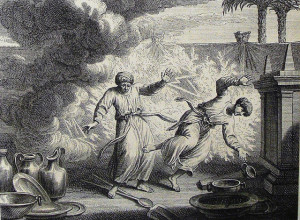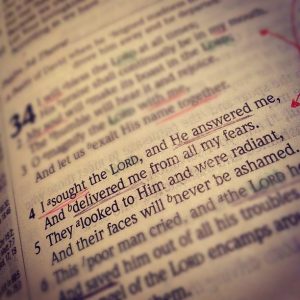Miriam and Aaron perfected the justification for the “Touch not my anointed” brigade when they challenged Moses’ decision to take an Ethiopian wife. That has become the proof text that men of God may not be challenged by those they lead – some sort of Clerical Immunity.
Korah and his company [1]Numbers 16 added fillip to this school when they told Moses and Aaron that both had appropriated the heritage of the assembly of God to the advantage of their own families. God decisively dealt with both instances of mutiny. Miriam was struck with leprosy and the mutineers were buried alive. Lesson: If you’d rather not be left leprous nor want the ground on which you stand to cave in under you, do not challenge the men of God.

Let’s start by establishing that between God and His priests no such immunity exists. In fact the good book suggests that the laity got away with worse indiscretions than those for which priests got throttled. Aaron’s family were exemplars of this polarity. Back to the book of Leviticus when the Aaronic priesthood had just been established and Aaron and his sons were consecrated as priests of God. Between chapters 1 and 8, God instituted several offerings and sacrifices, and He gave various instructions as to how offerings and sacrifices were to be conducted. After this, Aaron & his sons [2]Lev 8:31-36 were instructed to stay in the tabernacle for 7 days to fulfil their consecration, after which (on the 8th day) Aaron was to make several offerings for the priests and the whole of Israel. This was done and fire from the Lord came down and consumed the offering. [3]Lev 9:1-6 & Lev 9:23-24
In the throes of all this activity, Nadab and Abihu, sons of Aaron, decided to burn incense unto the Lord, and it was said that “they offered strange fire before the Lord, WHICH HE COMMANDED THEM NOT.” [4]Leviticus 10:1 The key to the strangeness of their fire is the second part of verse 1 – “it was not commanded of them to offer it.” If we look at Exodus 30:1-9, Aaron was the only priest commanded to burn incense; not Nadab, not Abihu, no one else. As a result, they were immediately struck down; a reaction which demonstrates a harsher side of the God.
Prior to this incident, Aaron fashioned a golden calf for the children of Israel to worship, a sin and abomination far greater than what Nadab & Abihu did. Aaron was not struck down, even though the people suffered for it. [5]Exodus 32:26-28 and Exodus 32:35 Note, however, this important and singularly differentiating factor: The sin of the golden calf was committed before Aaron & his sons had been consecrated unto the service of the Lord. Nadab and Abihu misbehaved after they had been consecrated unto the service of the Lord.
The priesthood is a position not just of authority but more importantly of responsibility
By the striking down of Nadab and Abihu God was making a clear statement to Aaron and the other priests – that His instructions were not to be played with after theyhad been consecrated. He was establishing that the priesthood was a position not just of authority but more importantly of responsibility. It’s almost as if God was saying to Aaron and the priests; “You might have messed about before and you got away with it. That was because you were yet to be totally consecrated in service to me and as such had not reached the age of responsibility. Now that you are, I expect a higher standard of responsibility from you.”
If God held biblical spiritual leaders to such levels of responsibility, it is more likely than not that the same responsibility is expected of the spiritual leaders in the modern day church. They too are to lead not just by word, but by example. If they err, they will only cause the people to err and will ultimately bring dishonour to the name of the God they have been called to serve. Let’s not say this is an Old Testament principle and as such does not apply to those under the New Testament; because Jesus made this observation when discussing the hypocrisy of the Pharisees. [6]Matthew 23:1-3
Some might conclude that the responsibility of keeping the spiritual leaders in check is left with God alone. That Christian followership should not get involved in correcting its leaders, as we are not permitted to question, challenge or heaven forbid, oppose those God has put in authority over us. And they might characteristically dig up Korah and company from the grave as a pertinent, classical example to warn us of the evil of resisting spiritual leadership. This approach tends to take these experiences out of context.
There is a Jewish concept of an argument ‘for the sake of heaven’. That even if you did something as bloody as Phineas’, [7]Numbers 25 in so far as it was done to sanctify God, then it was considered righteous. Korah, Dathan and Abiram were spoiling for a coup. They did not challenge Moses and Aaron on issues of law or ethics. They fancied themselves as leaders in place of these men whom God chose. They were challenging the prerogative of God to chose whosever He wanted. Miriam also was punished because of her jealousy. The bible records that in addition to speaking against a decision of Moses, she was clearly jealous of the way Moses was used by God and spoke about it. [8]Numbers 12:2 This is what incurred God’s wrath. Those characters did not contend with their leaders for the sake of heaven.
The impact a failed leadership could have on communities, temporal or spiritual, is often too grave for there not to be some mechanism by which one might sometime tug at the coat tail of leaders. No human is infallible.
The impact a failed leadership could have on communities, temporal or spiritual, is often too grave for there not to be some mechanism by which one might sometime tug at the coat tail of leaders. No human is infallible. Few come close the level of anointing on David. But even he was not above Satan’s cunning. 1 Chronicles 21:1 told of Satan moving David to conduct an ill-fated census. Joab could have resisted him. Perhaps in hindsight David might have wished that Joab resisted him. Joab did not. The anointed of the Lord had ordered a census at a time when the anointed of the Lord was under the yoke of Satan. Result: 70000 dead.
God Himself felt there was something missing in theocracy hence he raised up prophets to speak truth to power. Elijah against Ahab, Isaiah and Hezekiah etc. Peter, newly filled with the Holy Spirit, spoke truth to the Sanhedrin (the supreme religious body at the time) and condemned them for putting Jesus to death [9]Acts 4:8-12. Paul reprimanded Peter, a senior disciple, for his hypocrisy when dealing with the gentiles [10]Galatians 2:11-19. These men are the forerunners of present day Christianity and they held no sacred cows when dealing with leadership; whether within themselves or in the wider community.
Dear friends, although it may be difficult to believe, God is interested in the conduct of those He puts in positions of authority. He expects them to practice what they preach so that they can lead by example as well. Best of all, I believe that God does not mind if we speak up and challenge those who He put in positions of authority over us; especially where they are not leading by example.
Christian leaders are not above reproof, whether from God or man.


